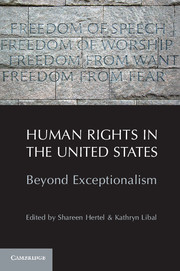Book contents
- Frontmatter
- Contents
- Contributors
- Acknowledgments
- Foreword: Are Americans Human? Reflections on the Future of Progressive Politics in the United States
- 1 Paradoxes and Possibilities: Domestic Human Rights Policy in Context
- SECTION I STRUCTURING DEBATES, INSTITUTIONALIZING RIGHTS
- SECTION II CHALLENGING PUBLIC/PRIVATE DIVIDES
- 6 The Curious Resistance to Seeing Domestic Violence as a Human Rights Violation in the United States
- 7 At the Crossroads: Children's Rights and the U.S. Government
- 8 Entrenched Inequity: Health Care in the United States
- 9 Business and Human Rights: A New Approach to Advancing Environmental Justice in the United States
- SECTION III FROM THE MARGINS TO THE CENTER: MAKING HARMS VISIBLE THROUGH HUMAN RIGHTS FRAMING
- APPENDIX 1 Universal Declaration of Human Rights
- APPENDIX 2 International Covenant on Economic, Social and Cultural Rights
- APPENDIX 3 International Covenant on Civil and Political Rights
- Index
- References
9 - Business and Human Rights: A New Approach to Advancing Environmental Justice in the United States
Published online by Cambridge University Press: 05 June 2012
- Frontmatter
- Contents
- Contributors
- Acknowledgments
- Foreword: Are Americans Human? Reflections on the Future of Progressive Politics in the United States
- 1 Paradoxes and Possibilities: Domestic Human Rights Policy in Context
- SECTION I STRUCTURING DEBATES, INSTITUTIONALIZING RIGHTS
- SECTION II CHALLENGING PUBLIC/PRIVATE DIVIDES
- 6 The Curious Resistance to Seeing Domestic Violence as a Human Rights Violation in the United States
- 7 At the Crossroads: Children's Rights and the U.S. Government
- 8 Entrenched Inequity: Health Care in the United States
- 9 Business and Human Rights: A New Approach to Advancing Environmental Justice in the United States
- SECTION III FROM THE MARGINS TO THE CENTER: MAKING HARMS VISIBLE THROUGH HUMAN RIGHTS FRAMING
- APPENDIX 1 Universal Declaration of Human Rights
- APPENDIX 2 International Covenant on Economic, Social and Cultural Rights
- APPENDIX 3 International Covenant on Civil and Political Rights
- Index
- References
Summary
For years, environmental justice advocates in the United States have relied mainly on domestic regulation and litigation to advance their claims. Recently they have also scored advances by bringing complaints against the U.S. government to international human rights tribunals and treaty bodies, including the Inter-American Commission for Human Rights, the UN Committee on the Elimination of All Forms of Racial Discrimination, and the UN Human Rights Council. These venues have carried new hope to U.S. activists after years of discouraging outcomes in domestic courts, where strict criteria for proof of contamination or of the intent of the offending corporations to discriminate have resulted in few satisfying judgments for victims of industrial pollution.
Alongside these efforts to hold the U.S. government accountable, a social movement has formed that uses the international human rights framework to address environmental degradation at its source – by insisting that polluting enterprises are responsible for complying with international human rights standards. The business and human rights (BHR) movement distinctively claims that international human rights law provides a hard legal benchmark against which companies can be judged and in accordance with which they must act, regardless of whether it is convenient, profitable, or will improve the company's reputation. BHR is conceptually distinct from another, older, and better known movement that seeks some of the same outcomes, namely corporate social responsibility (CSR). BHR insists that corporate compliance with human rights standards be legally obligatory rather than voluntary and an end in itself rather than a path to profit-making.
- Type
- Chapter
- Information
- Human Rights in the United StatesBeyond Exceptionalism, pp. 175 - 196Publisher: Cambridge University PressPrint publication year: 2011
References
- 7
- Cited by

